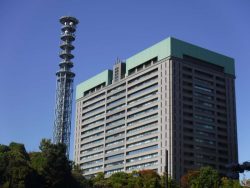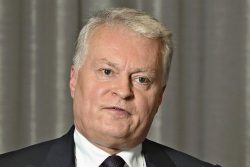Japanese Firefighter Who Worked in Quake-Hit Myanmar Hopes Others Will Help in Intl Relief Efforts

Daiji Morita speaks to reporters in Tsuchiura, Ibaraki Prefecture, on May 9.
15:08 JST, May 26, 2025
MITO — A firefighter crew chief from Ibaraki Prefecture who worked as part of relief efforts in quake-stricken Myanmar said he hopes those wishing to help others will take up the same challenge, despite the work being harder than expected.
Daiji Morita, a 31-year-old firefighter from Tsuchiura, was deployed as a member of a Japan Disaster Relief (JDR) team to Mandalay in central Myanmar, near the epicenter of the massive quake that struck the country on March 28. He went with about 35 other medical team members, including Foreign Affairs Ministry officials and doctors, from April 12 for two weeks.
Through the dispatch, Morita was able to contribute to the wider world, something he had long hoped to do, he said during a press conference in Tsuchiura on May 9.

Damaged buildings are seen in Mandalay, Myanmar, on April 1.
The Japan International Cooperation Agency dispatches JDR teams based on orders from the ministry. The teams are comprised of five groups, including a rescue squad and medical team.
In Mandalay, the team set up tents in a parking lot in the center of the city to be used as examination and X-ray rooms, among other purposes. They treated about 900 cases of injuries and illnesses. Morita said many buildings had collapsed in the city that was filled with rubble. He added that the walls of their hotel also had cracks.
Morita was responsible for the management of medical-related facilities and equipment. He checked whether the tents were in good condition, tested the water quality of water purifiers and managed generators. Since the temperature exceeded 40 C on some days, Morita said the work was “much more challenging than I had imagined.”
Team members checked in with each other over whether they properly ate and drank water. They also regularly monitored their heart rates for health purposes, and applied insect repellent to their clothing as well as their bodies since their sweat would wash it off.
Morita said he could feel the severity of the disaster from the expressions of quake victims. But he was somehow able to put them at ease and make them smile as he introduced himself in Burmese after he learned how from an interpreter.
One of locals gave the team fruit to express their gratitude, according to Morita. “It was good to see their smiles. I also felt how hospitable the people in Myanmar were since they warmly welcomed us,” he said.
Morita always had hoped to work for others as a JDR team member because he saw the devastation of the 2011 Great East Japan Earthquake when he was a high school student. One of his university professors who deployed to India as a medical team member also inspired him.
While working as a paramedic handling things such as emergency transport, Morita decided to register with JDR’s medical team last year. After completing his training, he was dispatched to his first country, Myanmar.
Morita was the only firefighter from the prefecture to be dispatched to the country following the earthquake.
The essence of his work — taking care of ill or injured people — is always the same whether he works in Japan or abroad. Determined to make the most of his experience in Myanmar, Morita said: “There are only a few firefighters in the prefecture registered with the JDR. I hope more will step forward and take up the challenge.”
Work experience and skills such as language necessary to apply for the medical team can be found on the JICA website.
"World" POPULAR ARTICLE
-

Glass Stresses Need for U.S.-Japan Alliance to Invest, Innovate; Commends Japan for Taking Leading Role in Region
-

Vietnam, Thailand Aim to Grow Rice Exports to Japan
-

Head of Interim Bangladesh Govt Yunus: Election to Be Held Between Dec. 2025 and June 2026; Cotton, LNG Eyed as Bargaining Chips in Bangladesh-U.S. Trade Talks
-

Egyptian Candidate for Unesco’s Top Spot Stresses Agency’s Role in Times of Crisis
-

S. Korea’s Lee Calls for Stronger Ties with Japan, U.S.; Aims to Improve ‘Deteriorated’ Relations with China
JN ACCESS RANKING
-

Aichi Rice Production Under Siege from Warming Climate; Record Heat Stunts Crop Growth, Causes Greater Pest Activity
-

Japanese Researchers Develop ‘Transparent Paper’ as Alternative to Plastics; New Material Is Biodegradable, Can Be Produced with Low Carbon Emissions
-

Japan’s Cooperation in Alaska LNG Development Project Emerges in Japan-U.S. Tariff Negotiations; But Industry Concerns Exist
-

Trump: Nippon Steel Will Part Own U.S. Steel, U.S. to Be in Control; Share Distribution, Other Details Remain Unclear
-

Average Retail Rice Price Up for Second Consecutive Week; More Than Double Same Period Last Year





















